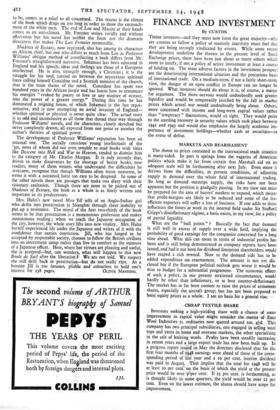FINANCE AND INVESTMENT
By CUSTOS
THOSE investors—and they must now form the great majority—who are content to follow a policy of masterly inactivity must feel that they are being strongly vindicated by events. While some recent developments underline the threats to the present level of Stock Exchange prices, there have been just about as many others which seem to justify, if not a policy of active investment at least a course of holding on. The main adverse factors in the investment prospect are the deteriorating international situation and the precarious basis of international trade. On a medium-term, if not a fairly short-term, view, the danger of an open conflict in Europe can no longer be ignored. What investors should do about it is, of course, a matter for argument. The more nervous would undoubtedly seek greatei liquidity and would be temporarily justified by the fall in market prices which actual war would undoubtedly bring about. Others, more concerned with income and long-term capital values rather than " temporary " fluctuations, would sit tight. They would point to the startling recovery in security values which took place between 1941 and 1945 and would also emphasise the largely academic im- portance of investment holdings—whether cash or securities—in the event of defeat.
MARKETS AND REARMAMENT
The threat to prices contained in the international trade situation is many-sided. In part it springs from the vagaries of American politics which make it far from certain that Marshall aid on an adequate scale will be forthcoming after next July. Even more it derives from the difficulties, in present conditions, of adjusting supply to demand over the whole field of international trading. So long as demand outstrips supply, the risks have not been apparent but the position is gradually passing. In my view one must be prepared for the area of buyers' markets to expand, which meanti that profit-margins are likely to be reduced and some of the less efficient exporters will suffer a loss of business. If one adds to these influences the forces at work in the internal field under Sir Stafford Cripps's disinflationary regime, a basis exists, in my view, for a policy of partial liquidity.
What are the "bull points" ? Basically. the fact that demand is still well in excess of supply over a wide field, implying the probability of good earnings for the companies concerned for a long time ahead. What tlaTS can mean in terms of industrial profits has been and is still being demonstrated as company reports have been issued, and had it not been for dividend limitation shareholders would have reaped a rich reward. Now to the demand side has to be added expenditure on rearmament. The amount is not yet dis- closed but if the European political outlook gets worse it would be wise to budget for a substantial programme. The economic effect' of such a policy, in our present straitened circumstances, would hardly be other than inflationary, or at best counter-deflationary. The market has so far been content to raise the prices of armament shares, especially the aircraft group, but has not been prepared to hoist equity prices as a whole. I see no basis for a general rise:
CHEAP TEXTILE SHARE
Investors seeking a high-yielding share with a -chance of some improvement in capital value might consider the-merits of Einu Wool Industries 5s. ordinaries now quoted around los. 41d. This company has two principal subsidiaries, one engaged in selling wool tops and yarns in home and overseas markets, the other specialising in the sale of knitting wools. Profits have been steadily increasing in recent years and a large export trade has now been built up. In a progress report issued in May the directors disclosed that for the first four months of t948 earnings were ahead of those of the corre- sponding period of last year and a to per cent. interim dividend was paid in August. That implies that the total for 1948 will be at least zo per cent on the basis- of which the yield at the present price would be over st-per cent. If 25 per cent, is forthcoming, as is thought likely in some quarters, the yield would be over tz per cent. Even on the lower estimate, the shares should have scope for improvement.


































 Previous page
Previous page